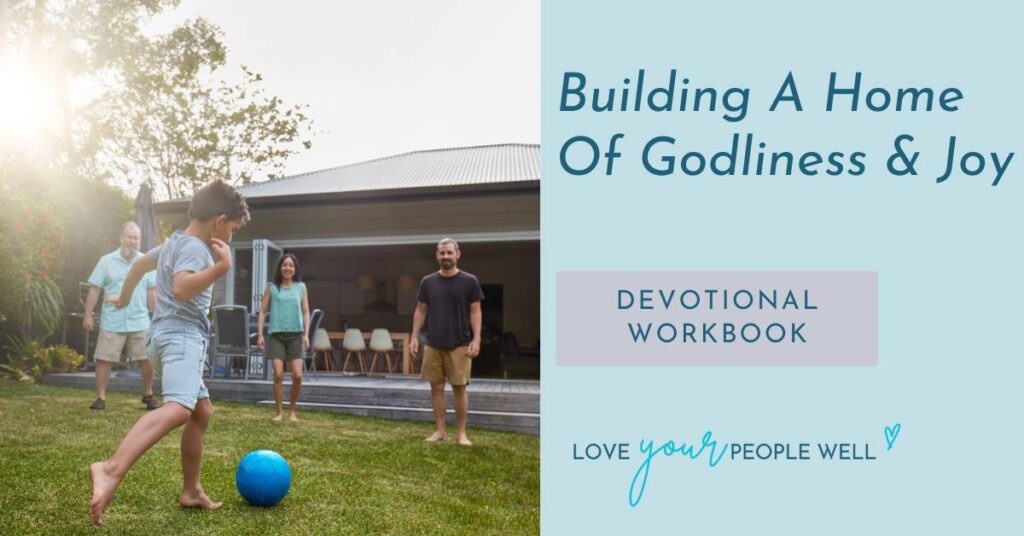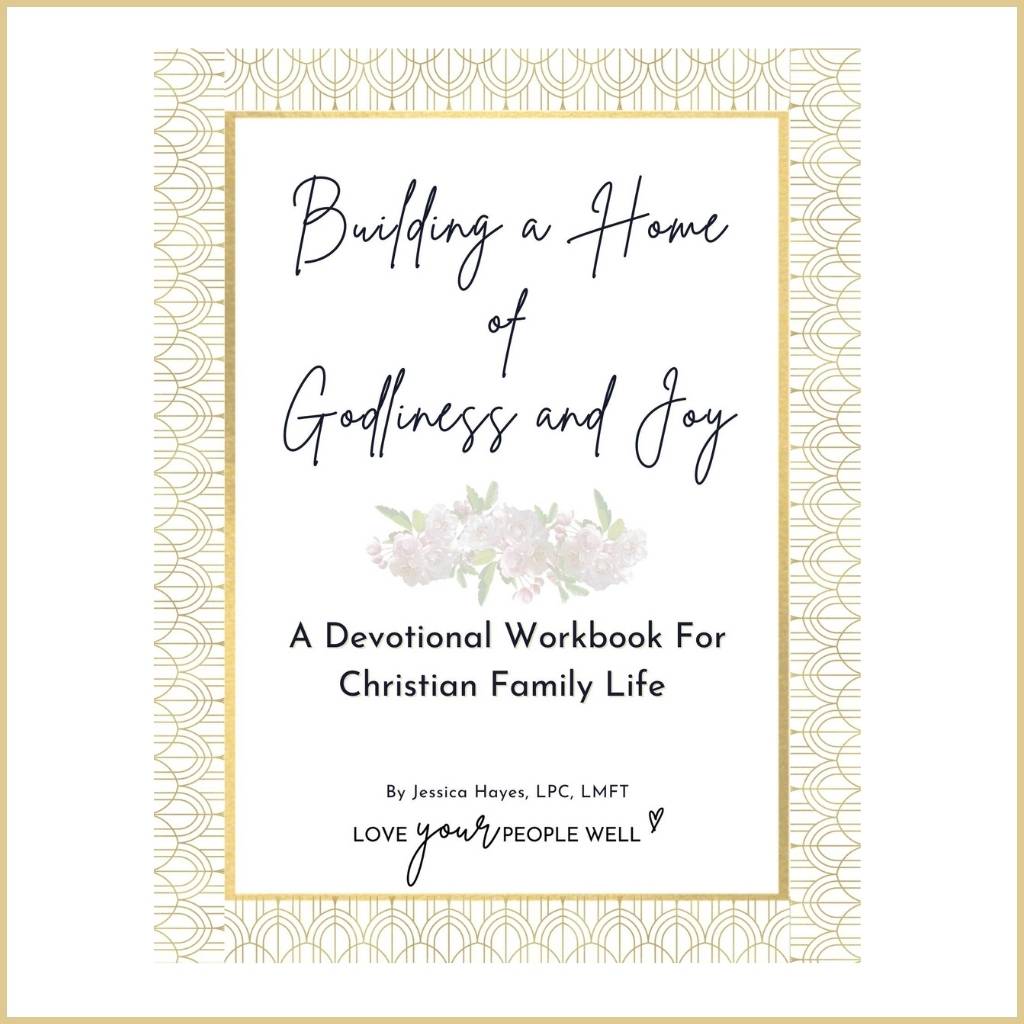God has a plan for godly relationships, and we will enjoy our home and family life much more if we are following his plan.
What are godly relationships in a Christian home?
Here’s the thing, friends. Scripture never changes.
God’s Word does not adjust just because we may want it to. God does not change his mind about what is good or right.
We might not understand something or feel like it’s old-fashioned, but Scripture is always true, always wise, and always good.
God has a plan for our family relationships. We will struggle with it (sometimes, a lot!) but we can trust that his plans are good, and we will enjoy our family life much more if we are following his plan.
This means understanding and following his plan for our family relationships: husband-wife, parents-children, sibling-sibling, and the family overall.
[This post may contain affiliate links. If a purchase is made, I may receive a small commission at no extra charge to you.]
Why do we struggle with godly relationships even though we are following Jesus?
There is a biblical picture of what a happy, healthy, and holy marriage looks like. And there is a biblical picture of what happy, healthy, and holy mothering looks like.
But there is also the reality of life.
Real life gets in the way of our godly relationships sometimes.
We sin. Our spouses sin. Our children sin. Other people sin against us.
Not to mention, the world is simply broken. There are natural disasters, health problems, and plenty of breakdowns in communication and emotional control.
RELATED: 5 Steps For How To Forgive And Forget In A Christian Marriage
But we want to have our eyes on the prize, as they say – and that means having our eyes on what Scripture defines as a happy, healthy, and holy Christian home. What should our family relationships really look like?
What does the Bible tell us is wise, good, and healthy in our Christian homes?
Using the Bible to paint a picture of healthy, godly relationships
There are two big sections in the New Testament that spell out the biblical relationship between wife-husband and between parents-children. We find it in Ephesians 5 and also in Colossians 3.
Since Ephesians 5 is longer and more detailed, this is a great place to focus as we try to live out godly relationships in our own homes.
But the reality in our broken, sin-stained world is that some of us carry a lot of hurt and pain when we try to understand healthy, godly relationships in the home.
None of us grew up in a perfect home. No marriage is perfect, and no parent is either. Sometimes, family relationships can bring great sorrow to our lives, either from past hurts or current struggles.
As we read what the Scriptures tell us is good and right in godly family relationships, we must take our struggles, questions, doubts, and hurts to the Lord. Jesus is here with us. He comfort us, carries us, and heals our wounds.
God’s Word does not change, but we may need help from the Holy Spirit (and perhaps from our pastor or a trusted counselor) to work through our personal struggles with God’s picture of godly relationships.
GRAB A FREEBIE: Download a practical, helpful 45-day Bible and Prayer Guide!
1. Submit to one another out of reverence for Christ (Ephesians 5:21)
The section in Ephesians 5 that begins exploring godly family relationships starts with a very important verse.
Submit to one another out of reverence for Christ. (Ephesians 5:21)
This biblical call is true for every family relationship. If everyone in the family was living this out well, there would be far less conflict, miscommunication, hurt, or power struggles!
“Submit to one another” does not mean that you are a doormat, just doing whatever the other person wants. It is better described in Philippians 2 as the mindset of Christ. It is approaching others with an attitude of humility and sacrifice, seeking to love them well, understand them well, and help them achieve all of the good that God wants for them.
God wants that same good for you too, and for every person in your family.
Everyone is valuable and should be treated with respect. Yes, everyone still has their own opinions and should discuss family decisions.
And of course, we must ground these family interactions in what truly matters: we are living this way “out of reverence for Christ.” This is at the heart of godly relationships in our Christian homes. We submit to one another, love one another, and sacrifice for one another because we love Jesus.
Wives and Husbands (Ephesians 5:22-33)
Godly relationships in the home start with the relationship between husband and wife. This is the foundational unit of the family. It’s how the family begins! God brings together husband and wife.
In the Bible, we see here that wives submit to their husbands as they do to the Lord, and husbands love their wives as Christ loved the church and gave himself up for her.
This is not easy.
In the best-case scenario, both husband and wife are engaging in this godly relationship in an honorable way. It is far easier for a wife to submit to a husband who is loving her like Jesus loves her – sacrificing for her, helping her, showing humility and kindness and being slow to anger. And it is far easier for a husband to sacrificially love his wife when she is respectful, thoughtful, and trusting his opinion and his decisions.
For many marriages, this is a struggle. Those hurts and struggles are valid and real, and may require some effort and help to get back on the right track.
RELATED: 5 Steps For How To Forgive And Forget In A Christian Marriage
But Ephesians 5 is showing us the right track. God is showing us his plan for godly relationships.
Ultimately, the husband-wife relationship is a picture of submission to Christ. Wives submit to their husbands as they submit to Jesus; it is really about their relationship with the Lord. Husbands are loving their wives like Jesus loved the church, and this comes from experiencing the love of Jesus personally.
GO DEEPER: Find more resources for a happy, healthy, and holy Christian marriage here.
Parents and Children (Ephesians 6:1-4)
The next godly relationship that we see is that between parents and children.
Children, obey your parents in the Lord, for this is right. “Honor your father and mother”—which is the first commandment with a promise— “so that it may go well with you and that you may enjoy long life on the earth.” Fathers, do not exasperate your children; instead, bring them up in the training and instruction of the Lord.” Ephesians 6:1-4, NIV)
Obedience is much easier when parents are careful not to exasperate their children. This means we are not frustrating them purposefully or unnecessarily.
Of course, parents will have rules or habits that children don’t like. Kids may feel frustrated by their parents sometimes. (Perhaps especially as they become teenagers!) Mom and Dad might be doing exactly the right thing, and the kids just don’t like it.
This is just good parenting, friends.
But parents can also fall into the temptation of a short temper and yelling… going overboard with rules… nagging or lecturing if we’re worried or frustrated ourselves. Maybe that’s just me… but this will frustrate our kids unnecessarily!
RELATED: Faith-Based Parenting When Life Is Overwhelming
What about for kids? Well, no matter how great the parenting is, children will not always obey. Just like none of us perfectly obey God our Heavenly Father!
God responds to our disobedience with patience, love, forgiveness, and GRACE. Let’s respond to our kids the same.
The only parent/child relationship that fully lives out this biblical picture is that between God the Son (Jesus Christ) and God the Father.
Jesus submitted and obeyed to the Father, even to the point of willingly dying on the cross. And while God the Father had boundaries, rules, and plans that Jesus did not always like (see his prayer in the Garden of Gethsemane!), He was consistently there to encourage Jesus, help him, lead him, and comfort him.
Parents are not subject to every whim or emotion of their children. In a godly relationship here, parents are prioritizing the right things (discipling their children in the faith) and are engaging in relationship with their kids, so that they don’t get unnecessarily frustrated, upset, or distant.
GO DEEPER: Find more resources for Christ-centered parenting here.
Godly relationships in the family as a whole (Colossians 3)
At the end of Colossians 3, we see a shorter version of the family relationships that we already saw in Ephesians 5. Wives and husbands, parents and children.
But throughout this chapter of the Bible, we also see a beautiful picture of how the whole family is relating in a Christian home.
What do we see happening in this chapter?
- We as individuals are focusing our thoughts and hearts in the right place: on Jesus Christ! (verses 1-4)
- The family is actively avoiding habits of sin, lying, cruelty, and rivalry. (verses 5-11)
- Each person is showing “compassion, kindness, humility, gentleness, and patience.” (verse 12)
- There is an overall attitude of forgiveness, working together, and love. (verses 13-14)
- The peace of Christ is ruling each person’s heart, which means the entire Christian home is peaceful, thankful, and filled with reminders of the gospel. (verses 15-16)
And perhaps Colossians 3:17 paints the best picture of a happy, healthy, and holy Christian home, where everyone is working toward godly relationships together.
And whatever you do, whether in word or deed, do it all in the name of the Lord Jesus, giving thanks to God the Father through him. (Colossians 3:17, NIV)
When we are doing everything in the name of Jesus, with gratitude in our hearts, our relationships with thrive. We will enjoy family life together. Our marriages, our motherhood, our homes will be everything we long for them to be.
Let's connect!
- JOIN MY EMAIL LIST for weekly tips, gospel encouragement, and a new coupon code each month.
- JOIN THE FAITH FIVER CLUB in our Patreon community, to support the ministry and get exclusive access to our private podcast, Q&As, and more.
- JOIN ME ON PINTEREST and on Facebook and Instagram too, for regular encouragement and fun.
And as they say... sharing is caring!
Related Posts:
Disclaimers: I am a licensed therapist but my podcast, blog, and resources are not professional or personal advice. I am an affiliate for many of the resources that I link to, and may earn a small commission if you purchase through my link. Read my full disclaimer here.






